September 1
Freethought Today Debuts
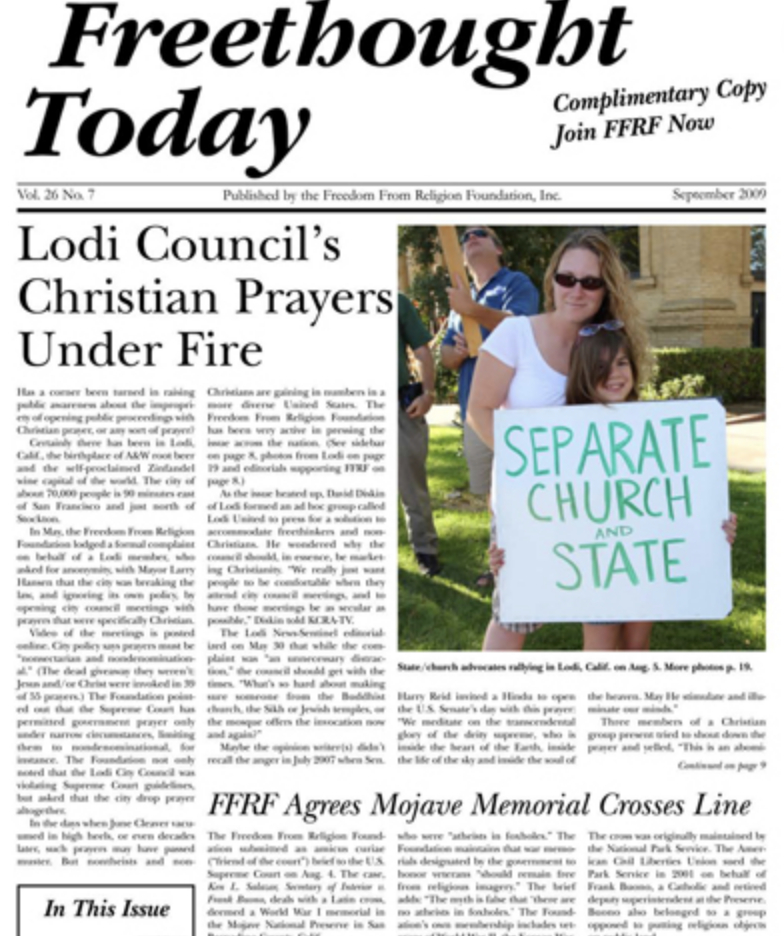
On this date in 1983, Freethought Today, the newspaper of the Freedom From Religion Foundation, debuted in Madison, Wisconsin.
—
Chapman Cohen
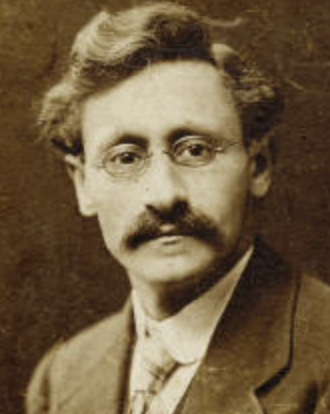
On this date in 1868, freethought advocate Chapman Cohen was born in Leicester, England, to Enoch Cohen, a confectioner, and his wife, Deborah (née Barnett). At the age of 21, he began a 50-year career as a popular and concise freethought writer and lecturer. When G.W. Foote died in 1915, Cohen succeeded him as president of the National Secular Society and editor of its publication The Freethinker.
Cohen was an efficient manager who brought security to the National Secular Society. He married happily and had a daughter, who died at age 29, and a son, who became a physician.
He gave up the NSS presidency in 1949 and handed The Freethinker over to F.A. Ridley in 1951. Cohen is considered the “last great Victorian freethinker.” (Victor E. Neuburg, The Encyclopedia of Unbelief) He wrote many articles and pamphlets, as well as Almost an Autobiography in 1940. (D. 1954)
“Gods are fragile things, they may be killed by a whiff of science or a dose of common sense. They thrive on servility and shrink before independence. They feed upon worship as kings do upon flattery. That is why the cry of gods at all times is ‘Worship us or we perish.’ "
— Chapman Cohen, "The Devil," undated pamphlet
Edgar Rice Burroughs
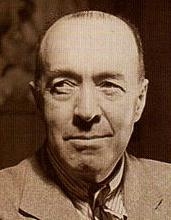
On this date in 1875, Edgar Rice Burroughs was born in Chicago. He graduated from the Michigan Military Academy in 1895 and enlisted in the U.S. Army in 1896 but was discharged after only a year due to a heart condition. He became a full-time writer of pulp fiction in 1912, the year he published his story “Tarzan of the Apes” in The All-Story Magazine. The story was an overwhelming success and Burroughs went on to publish 26 Tarzan novels, which became famous worldwide.
The novels detail the life of Tarzan, an Englishman who was raised by apes in the African jungle. The books have been made into over 50 different movies, beginning with the silent film “Tarzan of the Apes” in 1918, which was one of the first films to make over a million dollars. Tarzan novels have also been adapted into a 1932 radio drama, the Broadway play “Tarzan of the Apes” (1921) and Broadway musical “Tarzan” (2006), the Disney animated movie “Tarzan” (1999) and five television series.
Respect for his Tarzan stories has, despite their early popularity, diminished due to growing awareness of their implicit racist and imperialist prejudices that were rampant and rarely challenged in Western culture when he wrote them. Revised variations of the Tarzan theme in multiple genres since then have tackled the difficult task of reducing or removing the prejudices inherent in the core of the Tarzan concept, with varying degrees of success.
Burroughs wrote 50 other books, many of which were science fiction, including A Princess of Mars (1912), At the Earth’s Core (1914) and The Cave Girl (1925). He married Emma Hulbert in 1900 and had three children: Joan, John and Hulbert. They lived in Tarzana, Calif., which Burroughs founded in 1928.
On July 6, 1925, Burroughs published an article supporting evolution. He wrote, “If we are not religious, then we must accept evolution as an obvious fact. If we are religious, then we must either accept the theory of evolution or admit that there is a power greater than that of God.” Burroughs’ novel The Gods of Mars (1918) contained freethought themes, describing a deeply religious society where religion was a myth perpetuated as a way to cover up murder.
He died of a heart attack at age 74 a home in Encino, Calif. He was inducted into the Science Fiction Hall of Fame in 2003. (D. 1950)
"Men who had not progressed as far as we have tried to interpret [evolution] some two thousand years ago. It is not strange that they made mistakes. They were ignorant and superstitious."
— Edgar Rice Burroughs, New York America, July 6, 1925 (quoted in "Tarzan Forever" by John Taliaferro, 1999)
Patricia Duffy Hutcheon
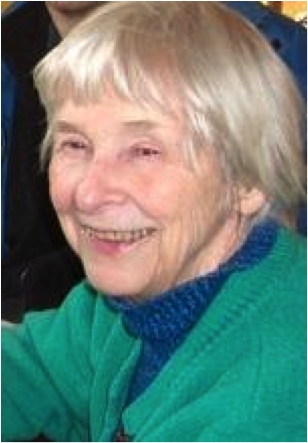
On this date in 1926, sociologist Patricia Duffy Hutcheon was born in Saskatchewan, Canada. She earned her undergraduate degree in education and history and her Ph.D. in sociology from the University of Queensland, Australia. In early adult life, because of several adverse personal experiences, she became active in promoting women’s rights and equality of the sexes. She married Alexander “Sandy” Hutcheon. She taught sociology at the University of Regina and the University of British Columbia. She was in great demand as a public speaker and became a prominent humanist in the academic world.
Her 1975 textbook, A Sociology of Canadian Education, was the first ever published on that subject and became a classic. She wrote many books, including Leaving the Cave: Evolutionary Naturalism in Social Scientific Thought (1996), Building Character and Culture (1999) and The Road to Reason: Landmarks in the Evolution of Humanist Thought (2001). In later life her studies focused on the trend of tribalism and the dangers it presented for society.
Hutcheon was named Humanist of the Year 2000 by the Canadian Humanist Association and received the Distinguished Humanist Service Award 2001 from the American Humanist Association. She also assisted in drafting the Humanist Manifesto III issued by the AHA in 2003. She was a member of the BC Humanist Association. (D. 2010)
"Only humanism has a planetary perspective already in place. It is up to us to try to persuade the more open-minded members of the world community to join us in rejecting tribalism before it is too late."
— Hutcheon in her essay, "Can Humanism Stem the Rising Tide of Tribalism?"
Lily Tomlin
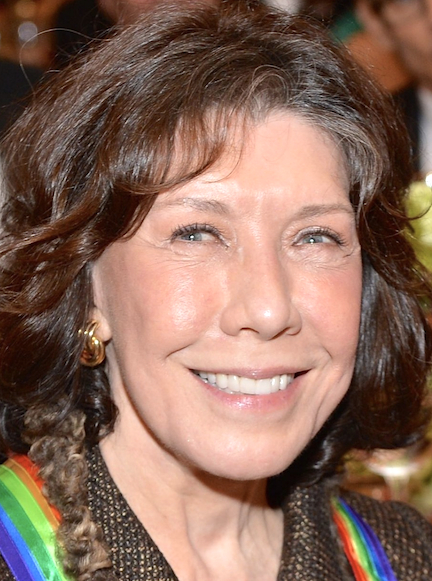
On this date in 1939, Mary Jean “Lily” Tomlin — actress, comedienne, writer, singer and producer — was born in Detroit (on the day Nazi Germany invaded Poland, starting World War II). Her Southern Baptist parents, Lillie Mae (Ford) and Guy Tomlin, were respectively a nurse’s aide and a factory worker who had moved to Detroit from Paducah, Ky., during the Great Depression.
“We were a working-class family,” she told the Irish Times in 2015. “My parents didn’t pay that much attention. They let us go our own way. In our neighborhood, the boy was okay if he didn’t end up in jail and the girl was okay if she didn’t get pregnant. That was the credo by which we lived.” She grew up “very well acquainted with the Bible and scripture.”
She enrolled after high school at Wayne State University to major in biology before switching to theater. Moving to New York without graduating, she worked as a bookkeeper and performed stand-up and off-Broadway using her mother’s first name to honor her, with the spelling changed slightly. (A guaranteed laugh line: “Why is it that when we talk to God we’re said to be praying, but when God talks to us we’re schizophrenic?”)
Tomlin’s first TV appearances were in 1965-66 on “The Merv Griffin Show” and “The Garry Moore Show.” Her breakout role in 1969 was on the comedy show “Rowan and Martin’s Laugh-In” (replacing Judy Carne). Her signature role Edith Ann was developed by her then-life partner and future wife Jane Wagner. Another major character was Ernestine, a less-than-helpful telephone operator who opened each sketch with “one ringy dingy…” Tomlin left “Laugh-In” in 1973.
She released several top-selling albums in the 1970s and won the 1972 Grammy for Best Comedy Recording. Her film debut was in director Robert Altman’s “Nashville” in 1975 in which she played a gospel singer and mother of two deaf children. She received Best Supporting Actress nominations for Golden Globe and Academy awards. She hosted the sixth episode of “Saturday Night Live,” which first aired on NBC in October 1975.
“The Late Show” with Art Carney in 1977 was a critical success as was “9 to 5” with Dolly Parton and Jane Fonda in 1980, one of the year’s top-grossing films. She landed roles in movies during the next three decades and teamed again in 2006 with Altman in his last film, “A Prairie Home Companion.”
Tomlin starred in 1985 in the one-woman Broadway show “The Search for Signs of Intelligent Life in the Universe,” written by Wagner. It won her a Tony and was made into a feature film in 1991. A Broadway revival in 2000 was followed by a two-year U.S. tour.
Television appearances included voicing Ms. Valerie Frizzle on the animated series “The Magic School Bus” on PBS from 1994-97, a role as the title character’s boss on the sitcom “Murphy Brown” and recurring roles on “Will & Grace,” “The West Wing” and the fifth season of “Desperate Housewives” in 2008–09.
“Lily Tomlin & Jane Wagner, Actor, Writer” says their star, installed in 2012, on the Hollywood Walk of Fame, the 345th star on the walk. They were married the next year on New Year’s Eve in a private ceremony in Los Angeles after 42 years together. Tomlin’s only sibling, her younger brother Richard, is also gay. Commenting on opposition to equal marital rights, she said in 2011 that “so much of it is just out of fear and ignorance or just narrowness of mind.”
Tomlin starred with Fonda in the 94-episode, seven-season Netflix original series “Grace and Frankie,” which debuted in 2015. They become friends after learning their husbands (Sam Waterston and Martin Sheen) are leaving them to be together romantically. Tomlin and Fonda both received Emmy nominations for Outstanding Lead Actress in a Comedy Series.
As of this writing, in a career spanning over 50 years, Tomlin has received seven Emmys, a Grammy and two Tonys, along with a Kennedy Center Honor in 2014 and the Screen Actors Guild Life Achievement Award in 2017.
She established the Tomlin Endowed Scholarship Fund in 1990 at Wayne State University in Detroit.
PHOTO: Tomlin receiving her Kennedy Center Honors Medallion in 2014; State Department photo.
“I’m not a religious person. I don’t have any desire. To me it’s imitative of a conventional culture. I’m all for it for anybody. I totally have a free and open feeling about how other humans want to live their lives. It’s just not something that has any real significance for me.”
— "Sunday Profile" interview (Australian Broadcasting Corp., Feb. 26, 2011)
